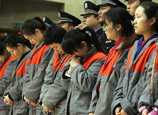
With the booming development of the Internet in recent years, China now has the world's largest population of netizens. They can not only express their independent viewpoints on State affairs, they can also exercise a supervisory role and even report clues of malfeasance. In fact, it has become common practice for Chinese people to exercise their right to freedom of speech online, as indicated by netizens' exposure of a series of recent corruption cases and infringements of people's rights by government officials and their settlement in a timely manner.
"Man is born free, and everywhere he is in chains," as French thinker Jean-Jacques Rousseau put it. It is a consensus that people's freedom of speech should be given legal and political boundaries. The political correctness that enjoys a tacit consent among the Western public is also a restraint on the expression of public opinion.
Ruling on the Gitlow v. New York case in 1925, the United States' Supreme Court made it clear that in the US freedom of speech and freedom of the press are guaranteed by the country's constitution. However, this does not mean a person is immune from punishment if they irresponsibly express their views. The ruling is tantamount to the legal principle that people are free to speak, but they are not fully free to act based on their remarks. Such a principle has not only laid the basic legal basis for the courts to handle cases related to freedom of speech and freedom of the press, it has also evolved into a universally recognized legal principle for the rest of the world.
Despite the Internet's burgeoning development in recent years, the increasing libel, fraud, defamation, identity theft and leaking of personal information have caused ever-growing concern and repulsion among the public. At the end of 2012, extensive debates were launched throughout various social circles in China about the Internet and freedom of speech. Afterward, a wide consensus was reached among netizens and the public that certain legal restrictions should be put on the Internet to create a clean environment for the expression of online views. In this context, China's top legislative body passed a regulation on Dec 28, 2012, requiring Internet users register for Internet services using their real names and online service providers enforce real-name registration.
The creation of such regulations based on extensive discussions with the participation of the whole of society demonstrates the full and real respect the Chinese government and the public have paid to the principle of the freedom of speech. This cannot be easily defamed by any self-proclaimed human rights guardians.

















 The journey is more important than the destination:Three people who opted for an adventure tell stories.
The journey is more important than the destination:Three people who opted for an adventure tell stories.


![]()
